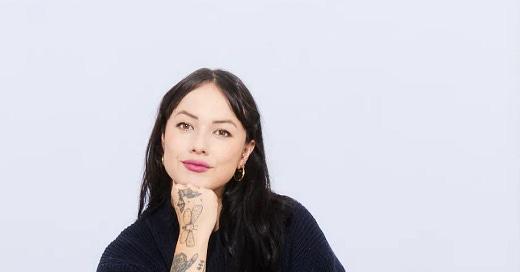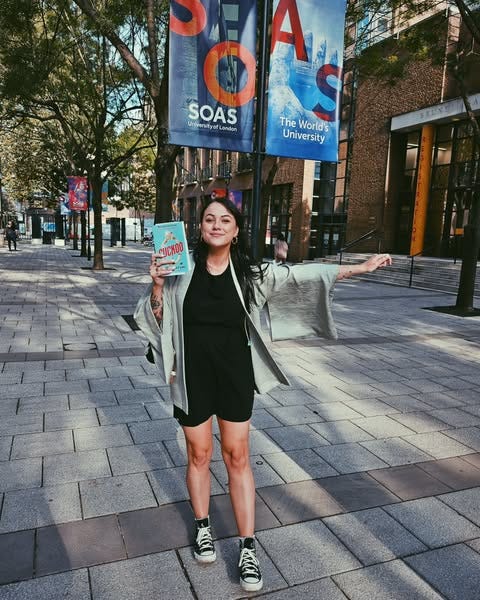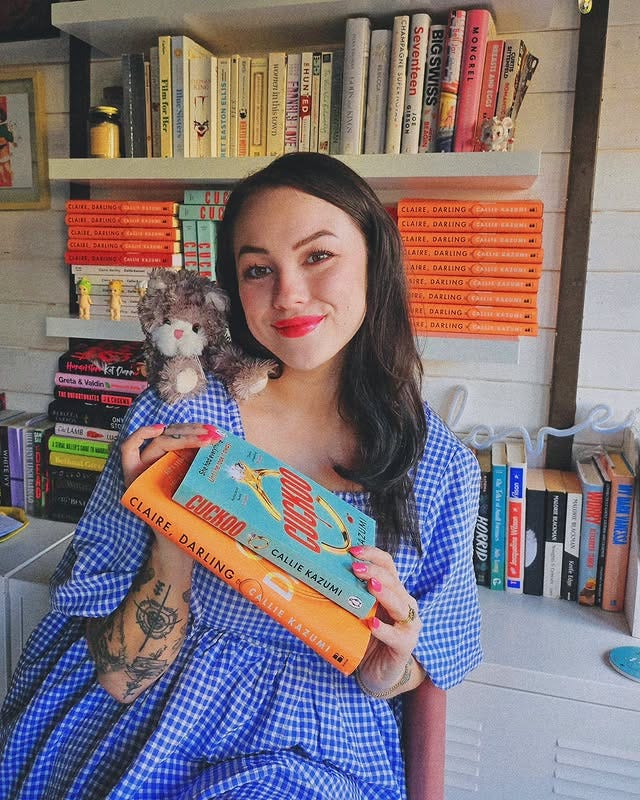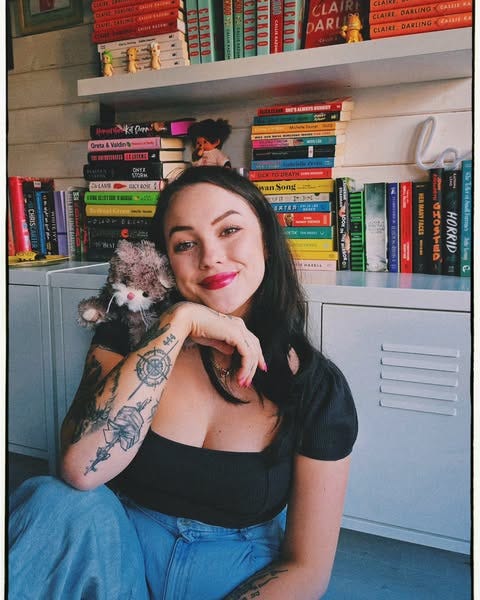Callie Kazumi: “Why did I keep this side of me hidden when it's something to be proud of?”
The author on feeling like she was faking her identity, layers of removal from her Japanese heritage and reclaiming her name
Hi, welcome back to Mixed Messages! This week’s guest is author Callie Kazumi, who is of mixed-Colombian, Scottish and Nikai Japanese heritage. Callie’s debut novel, Cuckoo, is a gripping thriller with a killer twist, as Claire discovers that she had no idea her fiancé Noah left his job months ago. After he disappears on their anniversary, Claire desperately tries to find Noah, but the truth is more chilling than she could ever imagine. Read Callie’s story below, plus why her pen name was such an important choice.
How do you define your identity?
My dad was British with Colombian and Scottish heritage, and my mother is Nikai Japanese, born in Brazil. Sao Paulo has the most Japanese migrants because Brazil cut a deal with Japan after the war for agricultural help. Loads of people moved over there and then just stayed.
I don't know how to define myself. I would say British-Japanese or mixed. I know a lot of people say ‘both,’ but there's a complexity with Japan. You can’t have dual-nationality, it’s either Japanese or nothing.
I'm very much still on a journey of learning what I want to be defined as, the book coming out has been a huge part of trying to reclaim [my identity] because I grew up in a super white town in Sussex. I was, and still am, white-passing, but when children saw my mother they’d see that there was an otherness to me. I got teased – never bullied, but nicknames that are inappropriate nowadays.
I was so embarrassed of my middle name, Kazumi. I just wanted to be like everyone else. I didn’t like people coming to my house and seeing anything that felt different to what they were used to. That changed when I worked in publishing. It was more diverse than when I worked in fashion, for the first time ever I was meeting other women who were East Asian or half-East Asian. Then I started to wonder, “why have I kept this side of me hidden when it's actually something to be so proud of?”
I wanted to own and learn about myself, so I started a journey. I signed up for Japanese classes, I went out there for the first time, I connected with my cousins in Japan. I made sure that my author bio said British-Japanese. I was in two minds about it, I felt like I didn’t have a claim to it and like I was faking my identity. I think it's because I'd spent so long denying that side of myself.
What does feeling more Japanese look like to you?
With my mum being Nikai Japanese, she speaks Portuguese and is the opposite of what a Japanese woman ‘should’ be. She’s very loud and quite vulgar. In Japan someone told her she spoke like a gangster, so I have this extra layer of removal [from Japanese identity.]
She’s basically estranged from her family and I think she feels foreign from Japan herself. I think she's ashamed, because she won’t talk about it with me or answer questions. That’s why I started reaching out to my cousins, whose parents also don’t like to talk about it.
I found that Japanese classes have opened such a door – there are so many mixed people there but they also hold a lot of socials where you learn things about culture – it’s going far beyond language. When I went to Japan, I felt at home. It was the first place I’d ever really felt comfortable. We went to Sendai, where they don’t really get tourists. When I explained that my grandparents are from here to a lady in a bar, she ran out back and came back with cookies and gifts. She welcomed me into her culture more than my mother has ever been able to.
What was your cultural upbringing like?
It was a strange situation. My parents spoke Portuguese at home, and my Nana on my dad’s side spoke fluent Spanish. The food we cooked was very Brazilian, then every now and again my mum would say “we have to have sushi and sit on the floor.” They never taught me to use chopsticks, which I begrudge massively. I've taught myself now. The music was Brazilian, then I watched a tonne of Japanese TV. It was a melting pot in our house all the time.
Why was it important to you to use your middle name as your pen name?
My father’s name was Robertson, he passed away in 2021. The only reason I would have used that name would have been for him. If he wasn't here to see it, I didn't want to use it because I didn't particularly have a nice childhood. My married name is Sutherland, but I only just got married a couple of years ago so it doesn’t feel like me. Kazumi is a reclamation – I've been embarrassed about this part of myself for so long, and I'm not anymore. I want everyone to know.
There’s a line in the book where one character notes that she thinks another is mixed-race – why was it important to have that moment?
East Asian women are beautiful and people think they’re not. She’s also a PT, which is not something you’d stereotypically associate with an East Asian woman.
I think if I’d made her completely East Asian, that might have leaned into another stereotype of sexualising her. Making her mixed is enough to break the bad stereotypes without leaning into the worst ones.
My second book is set in Japan and delves into themes of identity and being mixed much more heavily, but I can’t say too much about that yet.
Have you noticed any stereotypes around mixedness? How do you want the conversation to develop?
I think there’s stereotypes with mixed people but very rarely with mixed-Japanese people, largely because we’re white passing, and if we're not then people can't place us. Something that really annoys me is when people tell me I ‘don’t look’ Japanese. In Britain, I feel like there’s a beauty standard expectation for mixed-race people who aren’t mixed-Black to try and look more white. There’s also that old stereotype that East Asian women with white men must be mail order – that needs to go.
What’s the best thing about being mixed for you?
I'm open-minded and non judgmental of other people. The older generation don't want to try new things, try new foods or go to new places. Give it all to me! I want to experience all of it.
Can you sum up your mixed experience in one word?
Complex.
Buy Cuckoo now. Next week, I’ll be speaking to actor Sonera Theo Angel. Subscribe to get Mixed Messages in your inbox on Monday. Shop Mixed Messages tote bags and bookmarks on Etsy now!
Enjoy Mixed Messages? Support me on Ko-Fi! Your donations, which can start from £3, help me pay for the transcription software needed to keep this newsletter weekly, as well as special treats for subscribers. I also earn a small amount of commission (at no extra cost to you) on any purchases made through my Bookshop.org and Amazon affiliate links, where you can shop books, music and more by mixed creators.
Mixed Messages is a weekly exploration of the mixed-race experience, from me, Isabella Silvers. My mom is Punjabi (by way of East Africa) and my dad is white British, but finding my place between these two cultures hasn’t always been easy. That’s why I started Mixed Messages, where each week I’ll speak to a prominent mixed voice to delve into what it really feels like to be mixed.











Thanks so much for having me izzy!! 🖤